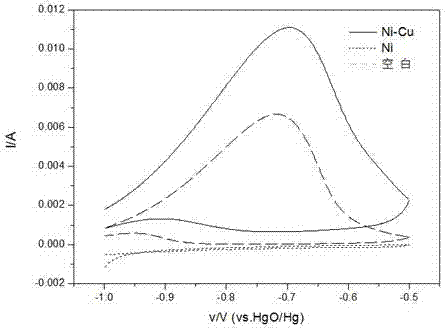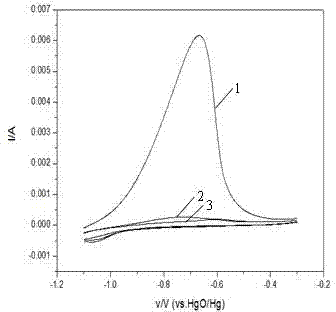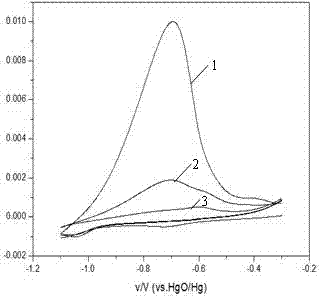Ni-Cu binary catalyst for improving performance of direct borohydride fuel cell
A fuel cell and catalyst technology, applied in the field of electrochemical applications, can solve the problems of low direct oxidation performance, high charge transfer resistance, and low fuel utilization rate, so as to enhance direct oxidation performance, reduce charge transfer resistance, and improve discharge efficiency effect
- Summary
- Abstract
- Description
- Claims
- Application Information
AI Technical Summary
Problems solved by technology
Method used
Image
Examples
Embodiment 1
[0015] Under normal pressure, the temperature is in the range of 293.15 ~ 313.15K, configure 0.25mol / L CuSO 4 solution (acidic conditions). 2cm 2 The Ni sheet (as the working electrode) is placed in the above solution, the Cu rod is used as the counter electrode, and the silver silver chloride electrode is used as the reference electrode. On the electrochemical workstation, the method of constant potential (-0.1V) is used for electrodeposition for 5s. , to prepare Ni-Cu binary catalyst. Weigh sodium borohydride, and dissolve it in 2mol / L sodium hydroxide solution to prepare 0.27mol / L sodium borohydride solution, mix well and use it as electrolyte for direct sodium borohydride fuel cell. 2cm 2 The Ni sheet and Ni-Cu were used as the working electrode, the mercury oxide mercury electrode was used as the reference electrode, and the graphite rod was used as the auxiliary electrode. Cyclic voltammetry was used for performance testing.
[0016] figure 1 gives NaBH 4 Anodic ox...
Embodiment 2
[0019] Under normal pressure, the temperature is in the range of 293.15 ~ 313.15K, configure 0.25mol / L CuSO 4 solution (acidic conditions). 2cm 2 The Ni sheet (as the working electrode) is placed in the above solution, the Cu rod is used as the counter electrode, and the silver silver chloride electrode is used as the reference electrode. On the electrochemical workstation, the method of constant potential (-0.1V) is used for electrodeposition for 5s. , to prepare Ni-Cu binary catalyst. Weigh sodium borohydride, and dissolve it in 2mol / L sodium hydroxide solution to prepare 0.27mol / L sodium borohydride solution, mix well and use it as electrolyte for direct sodium borohydride fuel cell. 2cm 2 The Ni sheet and Ni-Cu are used as the working electrode, the mercury oxide mercury electrode is used as the reference electrode, and the graphite rod is used as the auxiliary electrode, and the AC impedance spectroscopy performance test is carried out.
[0020] In the AC impedance sp...
Embodiment 3
[0022] Under normal pressure, the temperature is in the range of 293.15 ~ 313.15K, configure 0.25mol / L CuSO 4 solution (acidic conditions). 2cm 2 The Ni sheet (as the working electrode) is placed in the above solution, the Cu rod is used as the counter electrode, and the silver silver chloride electrode is used as the reference electrode. On the electrochemical workstation, the method of constant potential (-0.1V) is used for electrodeposition for 5s. , to prepare Ni-Cu binary catalyst. Weigh sodium borohydride, and dissolve it in 2mol / L sodium hydroxide solution to prepare 0.27mol / L sodium borohydride solution, mix well and use it as electrolyte for direct sodium borohydride fuel cell. 2cm 2 The Ni sheet and Ni-Cu were used as the working electrode, the mercury oxide mercury electrode was used as the reference electrode, and the graphite rod was used as the auxiliary electrode, and the constant current discharge performance test was carried out.
[0023] Figure 5 is at ...
PUM
 Login to View More
Login to View More Abstract
Description
Claims
Application Information
 Login to View More
Login to View More - R&D
- Intellectual Property
- Life Sciences
- Materials
- Tech Scout
- Unparalleled Data Quality
- Higher Quality Content
- 60% Fewer Hallucinations
Browse by: Latest US Patents, China's latest patents, Technical Efficacy Thesaurus, Application Domain, Technology Topic, Popular Technical Reports.
© 2025 PatSnap. All rights reserved.Legal|Privacy policy|Modern Slavery Act Transparency Statement|Sitemap|About US| Contact US: help@patsnap.com



